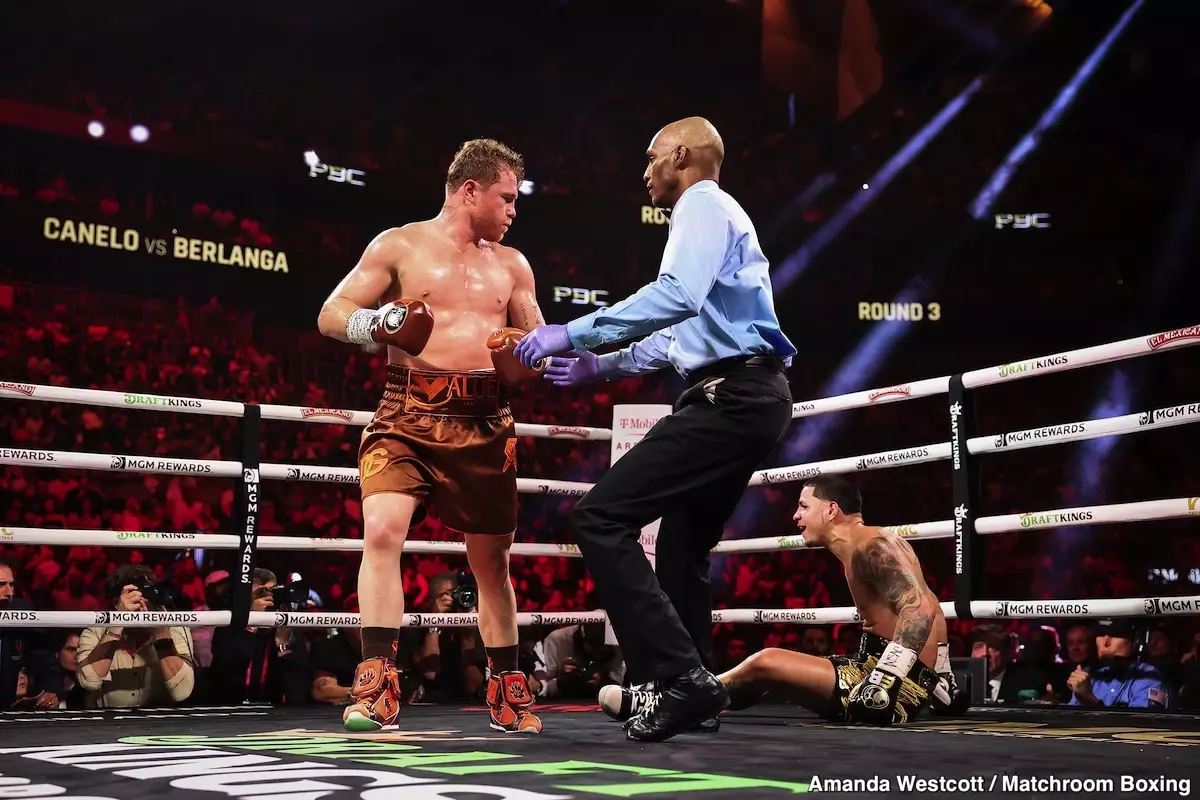Edgar Berlanga’s statement about dominating the super middleweight division reflects a common yet often misguided athlete’s mindset: overconfidence fueled by a string of victories. His declaration to “take over” the division after a victory over Hamzah Sheeraz and his audacious desire for a rematch with Canelo Alvarez embody a narrative of ambition that often outpaces reality. While confidence is essential in boxing, it must be tempered with humility and strategic development. Berlanga’s current record, with only one loss and 18 knockouts, provides a foundation for belief, but his overall competition level—and especially his very limited exposure to top-tier opponents—raises questions about his readiness to claim dominion over a division teeming with seasoned fighters.
This bravado, however, obscures a crucial truth: the journey to the top is a marathon, not a series of quick wins. Berlanga’s recent career moves, including a quick demolition of an uneventful opponent after his Canelo loss, seem more like attempts to preserve his star image than strategic steps toward genuine relevance in the division. His eagerness for a rematch with Alvarez, despite the slim odds of such a fight materializing soon, reveals a desire for quick recognition rather than a nuanced understanding of the process necessary for true greatness. Confidence must be guided by experience, adaptability, and consistent competition, not just bold proclamations.
The Myth of Star Power and the Reality of Building a Legacy
Berlanga’s comments about potentially fighting one more time this year—either in November or December—highlight an immature understanding of what it takes to cement a lasting legacy. The boxing landscape is littered with fighters who have fleeting moments of fame but lack sustained excellence. To truly “take over,” Berlanga needs to evolve beyond the narrative of knocking out lesser opponents and prove himself against consistent, highly ranked contenders.
His remark about fighting Sheeraz with the expectation of an easy night underscores a severe underestimation of his opponent’s capabilities. Sheeraz, though less seasoned, is a dangerous puncher with his own ambitions, and Berlanga’s history suggests he sometimes struggles with fighters who can punch back. The fact that Berlanga was dropped in the past and has struggled against journeymen indicates a vulnerability that rivals his bravado. Such flaws can be exploited by disciplined fighters with ambition of their own, and if Berlanga doesn’t address these weaknesses, his lofty ambitions will remain out of reach.
Dissecting the Path Forward: Talent, Strategy, and Humility
For Berlanga to realize his goal of dominating the 168-pound division, he must adopt a more disciplined approach. Confidence must be backed by strategic growth—improving boxing IQ, defense, and resilience. Relying solely on his power and a string of knockout wins is a dangerous game; opponents will inevitably adapt and expose his weaknesses. A critical aspect of his development should focus on learning from setbacks, not dismissing them as minor inconveniences.
Furthermore, the fantasy of an immediate rematch with Canelo reveals a disconnect from the actual landscape of boxing. Alvarez, an established legend, has little incentive to fight a less proven opponent with limited competition behind him. Berlanga’s branding as a future star is built more on hype than genuine progress. His reliance on trash talk and bravado, while useful in short bursts, won’t carry him to true superstardom unless his skill set catches up with his ambitions. The industry favors fighters who evolve, not those who rest on their laurels and past wins.
The Need for Authentic Growth Over Temporary Fame
Berlanga’s quick knockout of an underwhelming opponent after his loss to Canelo served more as a spectacle than a true benchmark of his capabilities. It’s a reminder that boxing career trajectories are marred by the paucity of meaningful opposition, and fighters often find themselves fighting down to their competition rather than rising to it. His dismissive attitude toward Sheeraz, calling him “nothing,” reveals an overconfidence that overlooks the inherent danger in underestimating fighters who are hungry and capable.
If Berlanga genuinely desires to dominate, he must learn to respect his rivals, study them meticulously, and develop resilience—attitudes that aren’t conveyed in bravado alone. The real power in boxing resides not just in knockout punches, but in the ability to adapt, learn, and display consistent excellence over time. It is through this lens that he will either stretch toward greatness or remain stuck in the illusion of it, forever chasing a division that might never recognize his true potential unless he matures beyond his current bravado.

